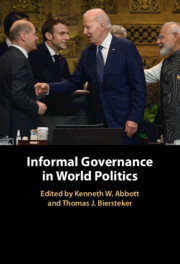Book contents
- Informal Governance in World Politics
- Informal Governance in World Politics
- Copyright page
- Contents
- Figures
- Tables
- Contributors
- Preface
- Acknowledgments
- Abbreviations
- Part I Introduction
- Part II Informality of Institutions
- 2 From Complex Interdependence to Complex Governance
- 3 Soft Pooling
- 4 Informal Governance in the Development Regime
- 5 Informal Governance of International Climate Policy
- 6 Why Do States Cooperate Informally?
- Part III Informality within Institutions
- Part IV Informality around Institutions
- Part V Normative Issues
- Part VI Conclusion
- References
- Index
2 - From Complex Interdependence to Complex Governance
from Part II - Informality of Institutions
Published online by Cambridge University Press: 23 May 2024
- Informal Governance in World Politics
- Informal Governance in World Politics
- Copyright page
- Contents
- Figures
- Tables
- Contributors
- Preface
- Acknowledgments
- Abbreviations
- Part I Introduction
- Part II Informality of Institutions
- 2 From Complex Interdependence to Complex Governance
- 3 Soft Pooling
- 4 Informal Governance in the Development Regime
- 5 Informal Governance of International Climate Policy
- 6 Why Do States Cooperate Informally?
- Part III Informality within Institutions
- Part IV Informality around Institutions
- Part V Normative Issues
- Part VI Conclusion
- References
- Index
Summary
Complex global and regional governance includes both the informality of governance institutions and informality around those institutions. National governments are only one category of actor, though an important one, among a more heterogeneous group of governors. The dynamics and evolution of globalization over time explain the emergence of complex governance in recent decades, an explanation that is complementary to those based on functionalism or domestic politics. Globalization alters actor incentive structures and reduces border effects, allowing nonstate and subnational actors to collaborate and reducing costs of participation in governance. Globalization has empowered actors: Emerging economies, INGOs, and MNCs. Globalization's future will continue to shape the prospects of complex governance.
- Type
- Chapter
- Information
- Informal Governance in World Politics , pp. 31 - 52Publisher: Cambridge University PressPrint publication year: 2024

